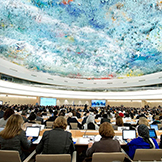Human Rights Council 35th session (6-23 June 2017)
Interactive dialogue with the Special Rapporteur on the right to education; and the Special Rapporteur on the right to freedom of peaceful assembly and association
7 June 2017
Statement of Ireland
Ireland aligns itself with the EU statement and adds the following.
Mr President
We welcome both Special Rapporteurs and thank them for their presentations today.
We welcome the report of the Special Rapporteur on the right to education, which provides a useful perspective on how non-formal education may assist States in meeting their obligations in connection with the right to education in a range of situations, including emergency and conflict situation. We note with particular interest the report’s contents in relation to the value and potential of coordinated partnerships between Governments and non-state actors including civil society and the private sector.
This theme has direct links to the report of the Special Rapporteur on peaceful assembly and association, highlighting the myriad ways in which civil society has improved societies all over the world.
We share much of the analysis in that report (A/HRC/35/28), both on the transformative role which civil society can and does play; as well as concerning the shrinking space for civil society. We strongly agree that repression and limitation of civil society is “self-destructive” and “short-sighted”. We call on all States to create and maintain, in law and in practice, a safe and enabling environment for civil society and to adopt the best practice recommendations in that regard as set out in HRC resolution 32/31.
As it is framed in the report, civil society has the ability to bring together groups with different and sometimes even competing interests, to achieve common goals. The real contribution of civil society in response to emergency situations, such as in the Ebola crisis, as well as its contribution in peacebuilding, such as with the Tunisian National Dialogue Quartet, is well sketched in the report.
We noted with particular interest the report’s findings on civil society participation in multilateral organisations. For us it is clear that substantive participation of civil society enriches debate and allows better results, regardless of forum. We see this here in the work of the Council including also the UPR – it is beyond doubt that notwithstanding its status as a peer review process, the substantive participation of civil society has made that process richer and more meaningful.
In that regard we agree with the report that more needs to be done to recognise civil society as having an equal stake in discussion in multilateral fora and to allow the full variety of voices and perspectives. We regret, for example, that civil society voices have been blocked in the NGO Committee twice this year.
We look forward in that regard to the report expected for HRC38 (June 2018) on procedures, challenges and best practices in respect of civil society involvement with regional and international organisations, including United Nations bodies, agencies, funds and programmes, and the contribution of civil society to their work.
We would welcome further comment, from both Special Rapporteurs, on this question of participation of civil society in regional and international organisations.
Are you aware of any best practice in connection with participation of civil society in regional and international organisations, regardless of the substantive field of their work? How can we best move forward, in all fora, to capture and capitalise on the multi-stakeholder partnerships foreseen as aiding in achievement of the 2030 Agenda?
Thank you

